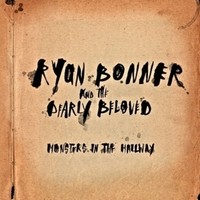 Naturally, the story within a song belongs to the person who penned the lyrics. And interpretations within said lyrics tend to vary greatly from writer to listener. However, I have long found it impressive when a songwriter can package a story and “give” it to a listener by allowing the lyrical content to stand on its own merit.
Naturally, the story within a song belongs to the person who penned the lyrics. And interpretations within said lyrics tend to vary greatly from writer to listener. However, I have long found it impressive when a songwriter can package a story and “give” it to a listener by allowing the lyrical content to stand on its own merit.
That being said, I am impressed.
Ryan Bonner’s Monsters In The Hallway is a genre-bending amalgam of alt-country instrumentation, folksy thinking man’s lyrics in a vein of emotive melody. But in so much more it is simply a testament of a young man left to his own devices as expressed through guitar strums and cerebral storylines.
“September” opens to demure acoustic guitar and builds through to a layered soundscape of banjo plucks, backing keys and bent-note pedal steel. The weepy country nuances meld with bluegrass banjo over elements of a down-tempo indie track the likes of Bright Eyes or Death Cab. “Marlene McQueen” continues the blue-collar storytelling with Bonner’s twang lyrical delivery harmonized with who can only be usual suspect Cory Jarrett. Intermittent banjo picks and breathy strums mix over the chorus within an ocean of ebbing and flowing cymbal crashes at the track crescendo. “Rise” features Bonner’s acoustic foundation with backing piano carrying the melody until the ubiquitous banjo joins and then cedes to more pedal steel. The verses climb with urgency toward the floodgate chorus rendering (in my opinion) the most technically tight track on the album.
Monsters In The Hallway was nice enough to present me with six stories that I can add to a multitude of others–I’ve “played a song in my head in September.” I’ve “found Anne Marie’s number in my coat pocket” and “I was down for the trip as my own Marlene was up for the ride.” And while I am familiar with Bonner’s work, usually it is within an acoustic stream with the occasional electric mandolin. Pairing with The Dearly Beloved has imparted a depth and girth to tracks that were meant to be bolstered with backing instrumentation. The only element missing is the whiskey-tinted rasp of Bonner’s voice (post-production work I am guessing), which imparts more of a raw, organic grit to the lyrical delivery but with the final product being what it is, this writer can live with that.
By Chris West
[Rating: 3.5/5]

